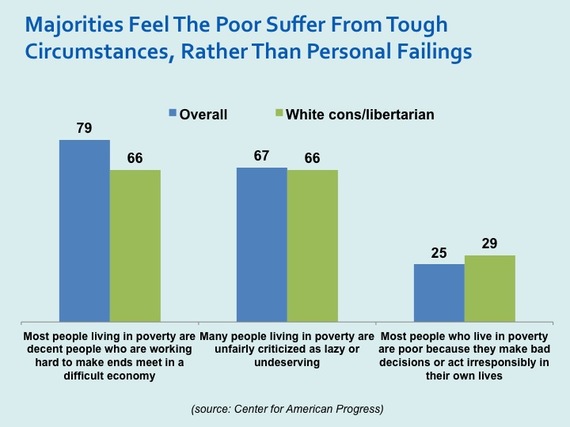Predictably, recent celebrations of the anniversary of the War on Poverty, votes to extend unemployment insurance, discussions of a minimum wage hike, and deliberation over cuts to SNAP (food stamps) have all fallen along familiar partisan fault lines. But voters' worries about--and personal experiences with--poverty and income inequality are more bipartisan than not.
Congress To America: You're Poor? Your Fault
Listening to some Republican leaders, you hear what psychologists call the fundamental attribution error. Time after time, Republicans say poverty comes from peoples' bad decisions, rather than tough circumstances. Voters know better.
Reps. Gohmert and Bachmann, and Senator Marco Rubio have all come out recently to pin poverty on mothers' behavior. Gohmert dusted off the old "mom of 15 children" trope. Rubio selectively used data from female-headed household, and ignoring other research altogether. Bachmann uses the familiar code words about the "importance of the family and the work ethic." Rep. Steve Southerland--Republicans' lead anti-SNAP crusader, has blamed the program for "draining" people's ambitions to work (even though most SNAP recipients work). Rep. Fincher also justified SNAP cuts by claiming the Bible prefers people to starve (though he himself receives millions in farm subsidies).
Voters, thankfully, are more sympathetic. According to a recent report by the Center for American Progress (CAP), voters consistently believe the poor are facing a tough economy, rather than personal failings. And while there are some differences, white conservatives and libertarians are in agreement.
However, there is still some worry about a culture of dependency. Over half (56%) of voters (and three-fourths of white conservatives/libertarians) say "Too many poor people would rather live off government benefits than work to lift themselves off of poverty" (emphasis mine). But this may not be inconsistent with believing most living in poverty are unfairly criticized or are decent people. "Too many" is subjective and can mean "any" to respondents, while "most" is clearly a majority.
Americans Feel the Pain of Poverty & Income Inequality
These concerns about the poor reflect both an increase in Americans feeling touched by poverty personally, and more worries about income inequality. The CAP survey shows a majority (54%) of Americans say they have a close family member who is poor, more than even during the 2008 peak of the economic crisis. And the average estimate of the number of Americans in poverty (39%) is far more than the reality (15%) and is a 10-point jump since 2008 (when the reality was 13%).
Given both experiences and perceptions of widespread poverty, majorities across party lines are dissatisfied with the distribution of wealth. According to Gallup, two-thirds of adults (including 54% of Republicans) are dissatisfied "with the way wealth and income are distributed." Pew has shown more feel the income gap has widened over the last decade.
Taken all together, this leaves Americans more pessimistic about what was once a top American source of pride: the potential for upward mobility. Gallup also shows continued increase in dissatisfaction with the opportunity for people "to get ahead by working hard." And here there is no party difference at all: 61% of Republicans and 60% of Democrats are dissatisfied.
Americans believe it's increasingly difficult for hard work to be rewarded, that poverty is on the increase, the poor are unfairly criticized, and wealth and income are not well-distributed. Yet members of Congress, most now millionaires themselves, wag their fingers at poor Americans. Given Congress's continued abysmal ratings, Americans are wagging their fingers right back.

